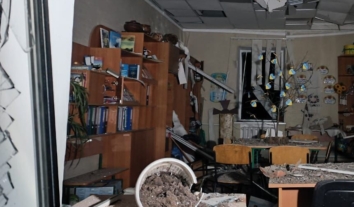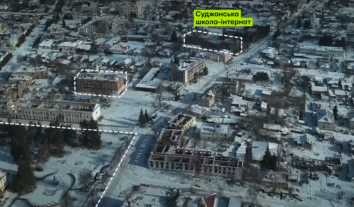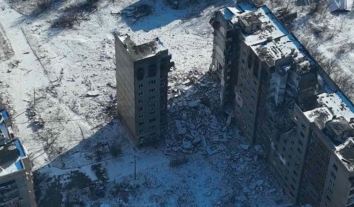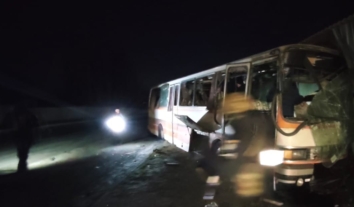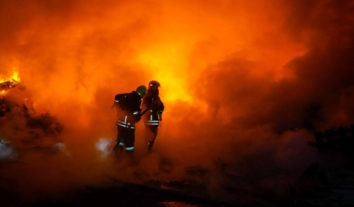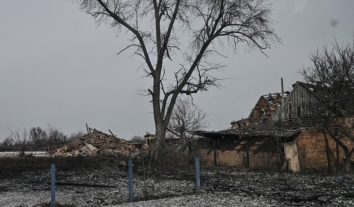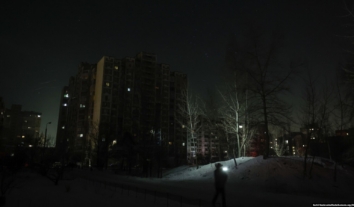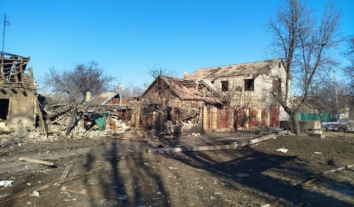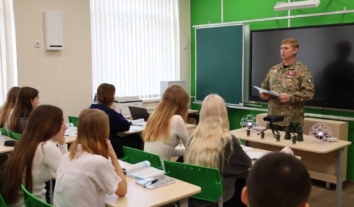Journalists not hope authorities will protect their rights
Journalist Georgiy Gongadze and all the fallen media members were commemorated on the Independence Square in Kyiv. Sixty-four journalists have been killed during the years of independence of Ukraine.
“Gia joked and laughed much. I came across a photo depicting him drawing some kind of nonsense with a felt-tip pen on my bald head during a press conference. On the one hand, it was funny to find this photo, but, on the other, it is sad to realize he has not been with us for 15 years already,” Head of the Independent Media Trade Union of Ukraine Yuri Lukanov says.
He and about one hundred media members gathered near the National Union of Journalists of Ukraine to commemorate Georgiy Gongadze, murdered in 2011, and other journalists killed while performing their duties.
After Georgiy Gongadze was murdered, the journalists have repeatedly defended their rights, Yuri Lukanov says. They defeated the libel law, managed to bring to justice those responsible for beating of journalist Olha Snitsarchuk and photo correspondent Vlad Sodel with mass protests.
However, Yuri Lukanov is outraged by the fact that the government doesn’t investigate effectively the crimes committed against journalists during the Euromaidan protests. He calls on the journalists to protest if the government continues pretending it carries out investigation:
“We’ve hoped that these cases will be investigated under the new government. However, only the empty promises are heard, unfortunately. The journalists are taken captive. The cases are not investigated again. I have a feeling that it’s time to organize systematic pressure on the government with the mass protests again. I believe that if the government does not listen to us, the media organizations will have to take matters into their own hands,” Yuri Lukanov notes.
Oleksandr Zahorodny, the TSN journalist, calls on his colleagues to unite to defend their rights, “We should unite with each other. We shouldn’t hope that the authorities or the president will defend us. We, not authorities, will be able to defend ourselves.”
First Secretary of the National Union of Journalists of Ukraine Serhiy Tomilenko urges the authorities and the law enforcement agencies to realize it’s not a normal thing to beat a journalist.
“It’s not a normal thing to beat a journalist. If an incident occurs, the right conclusions should be drawn. When, for example, 20 people in uniform with batons beat a photo correspondent, and the perpetrators cannot be identified, a police chief can at least apologize to the journalist because he was beaten by men in the uniform. However, the police chief says he shouldn’t apologize to every person beat by the police.” Serhiy Tomilenko says.
“A journalist on-the-job is equal to a policeman on duty. He is not a private individual, and he does not have his own will to quit work,” editor of the “Access to Truth” media outlet Lesya Hanzha notes.
The Secretary of the National Union of Journalists of Ukraine said that it was agreed on setting up of a working group to monitor the investigation into the crimes against journalists at the meeting in the Presidential Administration on September 16. The group will involve representatives of the media organizations, the Presidential Administration and the law enforcement agencies. The founding meeting is scheduled for September 23.
The media experts say that a journalist is either beaten, or threaten, or kicked out of the offices, court hearings, etc. in Ukraine almost every day. However, the offenders are not held liable.
“A normal country simply cannot have so many crimes against journalists not brought to court. Journalists are not some kind of special citizens, but the crime against a journalist is impunity, captured by cameras, giving a signal for the whole of society: you can be beaten, and the offender won’t be punished,” the Institute of Mass Information quotes media lawyer of the National Union of Journalists of Ukraine Tetiana Kotiuzhynska as saying.
The Institute of Mass Information has recorded 224 violations of the rights of journalists within the first eight months of this year. These violations include threats, obstruction of journalists’ activity, and physical violence.
“There are 27 cases of threats to journalists, ten facts of censorship, 48 cases of obstruction of activity, and 36 cases of physical violence against journalists. However, the Prosecutor General’s Office stated that only six cases under the Article 171 of the Criminal Code of Ukraine (obstruction of legal professional activities of journalists) had been submitted to court since beginning of the year. The majority of criminal proceedings have been closed,” Iryna Chulivska, the expert of the Institute of Mass Information, notes.
As a reminder, the militants of the so-called “Luhansk People’s Republic” have been holding journalist Maria Varfolomeeva captive for nine months.




















